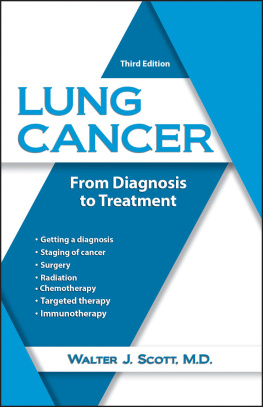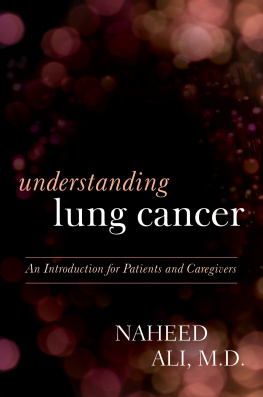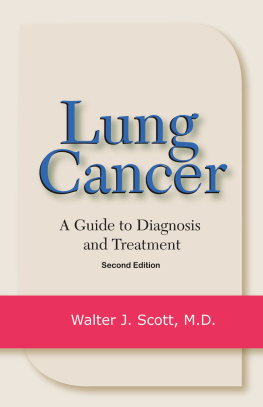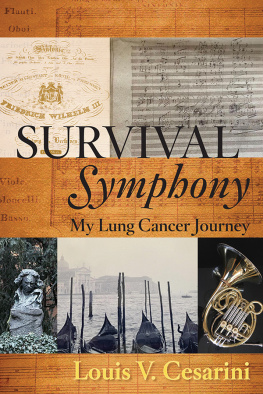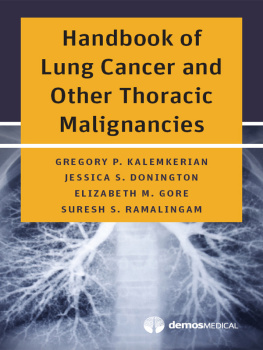Walter Scott - Lung Cancer
Here you can read online Walter Scott - Lung Cancer full text of the book (entire story) in english for free. Download pdf and epub, get meaning, cover and reviews about this ebook. year: 2018, publisher: Addicus Books, genre: Romance novel. Description of the work, (preface) as well as reviews are available. Best literature library LitArk.com created for fans of good reading and offers a wide selection of genres:
Romance novel
Science fiction
Adventure
Detective
Science
History
Home and family
Prose
Art
Politics
Computer
Non-fiction
Religion
Business
Children
Humor
Choose a favorite category and find really read worthwhile books. Enjoy immersion in the world of imagination, feel the emotions of the characters or learn something new for yourself, make an fascinating discovery.
- Book:Lung Cancer
- Author:
- Publisher:Addicus Books
- Genre:
- Year:2018
- Rating:3 / 5
- Favourites:Add to favourites
- Your mark:
- 60
- 1
- 2
- 3
- 4
- 5
Lung Cancer: summary, description and annotation
We offer to read an annotation, description, summary or preface (depends on what the author of the book "Lung Cancer" wrote himself). If you haven't found the necessary information about the book — write in the comments, we will try to find it.
Lung Cancer — read online for free the complete book (whole text) full work
Below is the text of the book, divided by pages. System saving the place of the last page read, allows you to conveniently read the book "Lung Cancer" online for free, without having to search again every time where you left off. Put a bookmark, and you can go to the page where you finished reading at any time.
Font size:
Interval:
Bookmark:
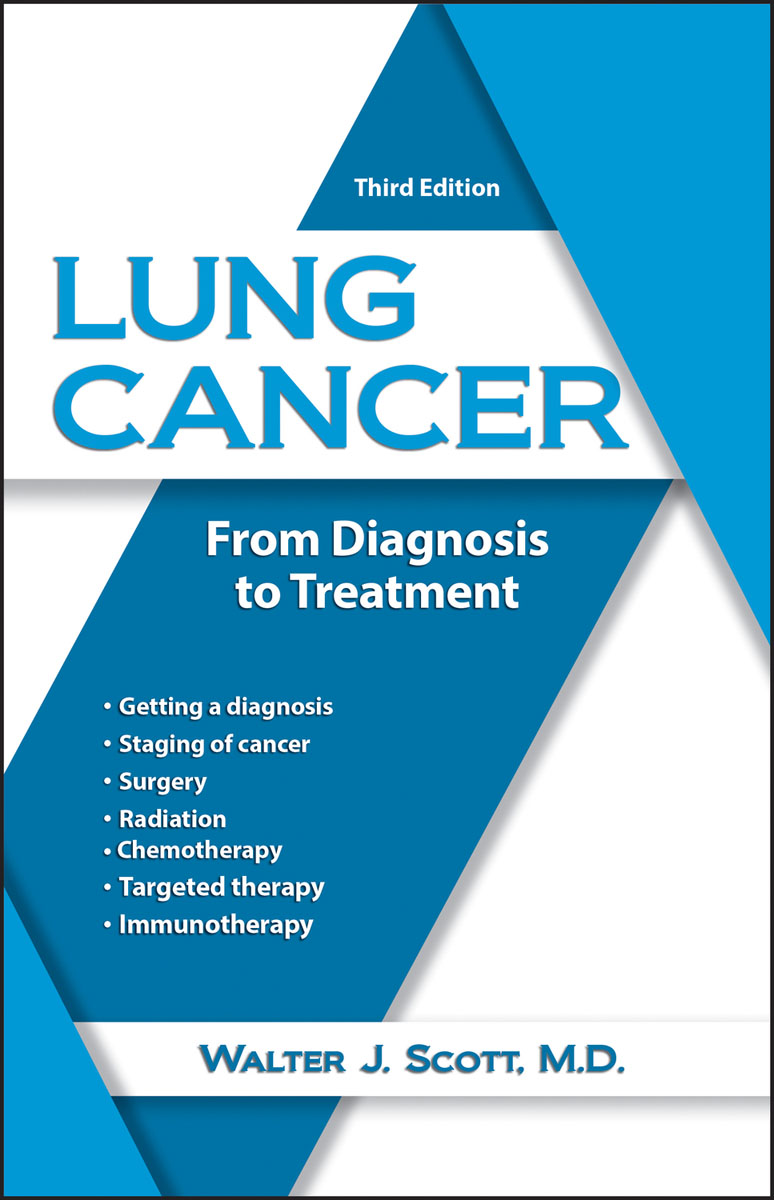
An Addicus Nonfiction Book
Copyright 2018 by Walter J. Scott, M.D. All rights reserved. No part of this publication may be reproduced, stored in a retrieval system, or transmitted in any form or by any means, electronic, mechanical, photocopied, recorded, or otherwise, without the prior written permission of the publisher. For information, write Addicus Books, Inc., P.O. Box 45327, Omaha, Nebraska 68145.
ISBN 978-1-943886-67-8
Cover design and typography by Jack Kusler
This book is not intended to be a substitute for a physician, nor does the author intend to give advice contrary to that of an attending physician.
Library of Congress Cataloging-in-Publication Data
Names: Scott, Walter, 1954-author.
Title: Lung cancer : from diagnosis to treatment / Walter J. Scott, M.D. | Description: Third edition. | Omaha, Nebraska : Addicus Books, [2017] | Includes bibliographical references and index. | Identifiers: LCCN 2017044796 (print) | LCCN 2017045997 (ebook) | ISBN 9781943886722 (ebook) | ISBN 9781943886739 (ebook) | ISBN 9781943886746 (ebook) | ISBN 9781943886678 (paperback) | Subjects: LCSH: LungsCancerPopular works. | BISAC: HEALTH & FITNESS / Diseases / Cancer. | MEDICAL / Diseases. | Classification: LCC RC280.L8 (ebook) | LCC RC280.L8 S36 2017 (print) | DDC 616.99/424dc23
LC record available at https://lccn.loc.gov/2017044796
Addicus Books, Inc.
P.O. Box 45327
Omaha, Nebraska 68145
www.AddicusBooks.com
Printed in the United States of America
10 9 8 7 6 5 4 3 2 1
What lies behind us and what lies before us are tiny matters compared to what lies within us.
Ralph Waldo Emmerson
18031882
T his book would not have been possible without the efforts of a great many people. Most importantly, I wish to express my gratitude to my patients and their families for the trust they have placed in me over the years.
I also wish to thank the members of the multidisciplinary oncology team of the Abington Jefferson Hospital and the Sidney Kimmel Cancer Center of Thomas Jefferson University Hospital for their commitment to improving the care of patients with lung cancer. Thanks also to the medical students, residents, and fellows of Abington Jefferson Hospital and the Thomas Jefferson University Hospital for their hard work and tough questions.
I would like to thank Balazs Halmos, M.D., Director, Thoracic and Head & Neck Medical Oncology and Clinical Cancer Genomics, at Montefiore Medical Center, Albert Einstein College of Medicine, Bronx, New York, for his valued contribution to section on immunotherapy and targeted therapy.
I thank Addison Tolentino, M.D., medical oncologist and co-author of Colon and Rectal Cancer, for his help with the chapter on chemotherapy. I also thank Carol Kornmehl, M.D., radiation oncologist and author of The Best News about Radiation Therapy, for her contribution to the chapter on radiation therapy. In addition, I thank Mark Pool, M.D., laboratory medical director at Riverside Medical Center, in Kankakee, Illinois, for his help with the development of this book.
Once again, I am grateful for the support of Rod Colvin and Jack Kusler of Addicus Books. Their patience and guidance throughout the preparation of the manuscript have helped to make this a much more useful book.
Finally, a special thank you goes to my wife, Christine Beardmore, M.A., a psychotherapist, for her help with the chapter on emotional support.
I f you are reading this book, you or someone you care about has probably been diagnosed with lung cancer. Over the years, many of my patients have told me that, after their diagnosis, they were overwhelmed by the sheer number of medical tests, procedures, and treatments they had to undergo. It is my intention in writing this book to take away some of the fear of the unknown and provide you with answers to the pressing questions you have about your diagnosis and treatment.
If you have been diagnosed with lung cancer, your survival and your quality of life depend on understanding your options and making sure you receive the best available treatment. Thanks to new treatments and new combinations of treatments, thousands of men and women survive lung cancer each year. My wish is that you will receive the best possible treatment so that you can improve your chances of becoming a lung cancer survivor.
Walter J. Scott, M.D., F.A.C.S.
1 | Lung Cancer: An Overview |
H asnt it seemed that cancer was always something that happened to someone else? But now, you or perhaps a loved one has been diagnosed with lung cancer. Your initial reaction may have been shock or that feeling of dread that comes with having your worst fears confirmed. You may feel sad, confused, and scared. These are normal reactions.
After receiving the initial diagnosis, you may have wondered what happens next? What medical tests will you undergo? What treatment will you need? Hopefully, the chapters that lie ahead will answer many of your questions. To start, however, this first chapter will give you a basic understanding of lung cancer.
Cancer is a collection of cells growing out of control. The cells in our bodies are constantly growing, and each cell contains a set of instructions, like software in a computer, that regulate cell behavior. Sometimes, a change, or mutation, occurs in a cells growth pattern. When these mutations continue to occuras many as ten to twenty may be requiredthe once-normal cells begin to grow abnormally. These new growths are called cancers.
Lung cancer usually arises from the cells that line the airways and the nearby mucous glands. When the airways are exposed to toxins we inhale, the transformation of normal cells to cancer begins with a condition called hyperplasiaan increase in the number of cells lining one part of the airways through which we breathe. This is followed by the development of dysplasia, which is an increase in the number of abnormal cells that line the airways. From this point, malignant cells can emerge. If left untreated, these cells can continue to grow and invade surrounding tissues.
There are three ways cancer can spread: into surrounding tissues from the original tumor, through the blood, or through lymph nodes. The lymph nodes are part of the bodys immune systemthey filter the blood for foreign particles, such as bacteria or cancer cells. There are hundreds of lymph nodes throughout your body. Normally, when not inflamed or cancerous, lymph nodes are the size of raisins. Lung cancer can spread to lymph nodes in the chest.
In addition to spreading to lymph nodes, the malignant cells can escape into the bloodstream and travel throughout the body. Lung cancer most commonly spreads to the liver, but can also spread to the bones, bone marrow, brain, and adrenal glands. When a secondary cancer forms in any of these organs, it is called a metastasis.
There are more than a dozen types of lung cancer, but more than about 90 percent of them fall into two main categories: non-small cell lung cancer and small cell lung cancer. These two forms of lung cancer grow differently and are also treated differently. Whether the cancer is non-small cell or small cell is determined by the size and other characteristics of the cancer cells as they appear when viewed through a microscope.
Next pageFont size:
Interval:
Bookmark:
Similar books «Lung Cancer»
Look at similar books to Lung Cancer. We have selected literature similar in name and meaning in the hope of providing readers with more options to find new, interesting, not yet read works.
Discussion, reviews of the book Lung Cancer and just readers' own opinions. Leave your comments, write what you think about the work, its meaning or the main characters. Specify what exactly you liked and what you didn't like, and why you think so.

